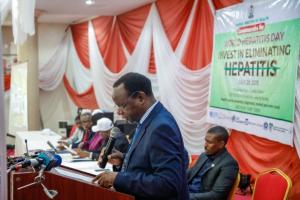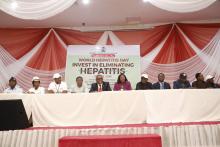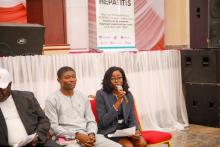World Hepatitis Day: Nigerians implored to be screened and vaccinated
Abuja, 30 July, 2019 - As Nigeria and other countries commemorate the 2019 World Hepatitis Day (28 July) with the theme “Invest in Eliminating Hepatitis”, stakeholders agree that early detection and childhood vaccination will curb the burden of the disease by 2030.
As part of the commemorative events, a Ministerial press briefing held on 30 July 2019 during which the Permanent Secretary (PS), Federal Ministry of Health (FMoH) Alhaji Abdullahi Mashi said, “It’s sad to note that Nigeria bears a huge burden of viral hepatitis”.
The PS released preliminary findings of the viral hepatitis component of the recently concluded Nigeria HIV/AIDS Indicator and Impact Survey (NAIIS) survey. The survey revealed a national prevalence of 8.1% for hepatitis B and 1.1% for Hepatitis C for the 15-64 years. HIV/HBV co-infection and HIV/HCV co-infection rates were 9.6% and 1.0% respectively among people living with HIV (PLHIV) aged 15-49 years.
The PS was represented by Dr Evelyn Ngige, Director Health at the event who pointed out the debilitating diseases that Hepatitis B infection leads to and that often ends in death if not caught and treated early. She said, “Hepatitis B infection may lead to liver cirrhosis and cancer”. She encouraged every Nigerian to go for screening and know their hepatitis status. She thanked WHO Nigeria for the laudable support being provided in the country’s fight against hepatitis. She indicated that with this support, the country has all necessary tools and work has started at state level to expand access to viral hepatitis diagnosis and treatment services.
In his remarks at the Press Conference, the Officer in Charge (OIC), Dr Clement Peter Lugala, represented by Dr Rex Mpazanje, congratulated the Government of Nigeria for the comprehensive Hepatitis B vaccination programme encompassing birth dose and pentavalent vaccine as part of the country’s national childhood immunization schedule. “We believe that childhood vaccinations will greatly help to curb the burden of viral hepatitis B among the vaccinated population by 2030,”
“We wish to also commend the Government of Nigeria for their decision to end open defecation in Nigeria by 2025. This will additionally help to curb Hepatitis A and Hepatitis E which are largely caused by poor environmental sanitation and personal hygiene”. Additionally, WHO is proud to be part of the partnership that has facilitated increased availability and affordability of the Hepatitis B and C treatments. For the benefits of these to be realized, he called for a culture of routine hepatitis screening especially for the generations that didn’t benefit from childhood hepatitis B immunization and intimated the national stakeholders that “with additional investment in diagnosis and treatment, viral hepatitis elimination is possible in Nigeria by 2030.”
There are five key viruses that cause viral Hepatitis, identified with letters A through to E. Viral hepatitis A and E mainly cause acute illness, hence supportive treatment is given to those who become very sick to prevent worsening of the acute illness. Viral hepatitis B and C cause chronic illness that can lead to liver cirrhosis and cancer. Hepatitis A and E are mainly transmitted through unsafe water and inadequate inter-personal hygiene while hepatitis B and C are transmitted through blood and other body fluids.
Technical Contact:
Dr Rex Mpazanje; Email: Mpazanjer [at] who.int (Mpazanjer[at]who[dot]int); +234 803 6389 632
Dr Ilesanmi, Oluwafunke; Email: Ilesanmio [at] who.int (Ilesanmio[at]who[dot]int); +234 807 7590 066





